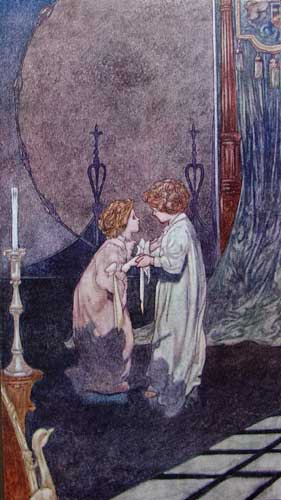| |
Chapter 2
 The
ordinary lot of women is to be more good than beautiful or more beautiful
than good. But the Duchess of Clarides was as good as she was beautiful,
and she was so beautiful that the princes who had only seen her picture
had wished to marry her. To all their proposals she answered: “As
I have but one soul I will never have but one husband.” The
ordinary lot of women is to be more good than beautiful or more beautiful
than good. But the Duchess of Clarides was as good as she was beautiful,
and she was so beautiful that the princes who had only seen her picture
had wished to marry her. To all their proposals she answered: “As
I have but one soul I will never have but one husband.”
Yet she only wore mourning for five years. Then she put off her long veil
and black clothes, for she did not like to depress those around her or
to prevent them smiling or being merry in her presence. Her Duchy included
large tracts of land, and lonely moors covered in all their vast extent
with heather; also lakes where fishermen caught fish, some of which were
magical, and mountains, terrible and lonely, beneath which the dwarfs
lived in their underground kingdom.
In the government of the Clarides she followed the advice of an old monk
who had escaped from Constantinople. His belief in the wisdom of men was
small, for he had seen how brutal and perfidious they are. He lived shut
up in a tower with his birds and his books, and there he performed his
duties as counsellor, acting according to very few principles. His rules
were: “Not to revive obsolete laws; to give way to the wishes of
the people for fear of rebellion, but to give way as slowly as possible,
because, when one reform is carried out, the public immediately demand
another. Princes are deposed for giving way to quickly, just as they are
for resisting to long.”
The Duchess, understanding nothing at all about politics, let him do as
he pleased. She was charitable, and, as she could not like all men, she
was sorry for those unfortunate enough to be wicked. She helped the unhappy
in every way possible, visited the sick, consoled widows, and provided
for orphans.
She brought up her daughter Bee with the most charming wisdom. She taught
this child only to take pleasure in doing good, consequently she could
indulge her to any extent.
This amiable lady kept her promise made to the poor Countess of the White
Moor. She acted as a mother to George and made no distinction between
Bee and him. They grew up together and George found Bee to his taste,
though rather small. One day, while they were still in their earliest
childhood, he came to her and said: “Will you play with me?”
“I would like to,” said Bee.
“We will find some sand and make sand pies,” said George.
So they made pies, but as Bee did not make hers very well, George hit
her on her fingers with his spade. Bee uttered the most piercing shrieks,
and the squire, Freeheart, who was walking in the gardens, said to his
young lord: “It is not a deed worthy of a Count of the White Moor
to beat young ladies, your Highness.”
George’s first impulse was to thrust his spade right through the
body of the squire. But as the difficulties of this enterprise seemed
insuperable, he fell back upon an easier course of action, which was to
turn his face against a big tree and weep copiously.
In the meanwhile, Bee took good care to keep her tears flowing by digging
her fists into her eyes; and, in her despair, she flattened her nose against
the trunk of a neighbouring tree. When night began to cover the earth,
George and Bee were still weeping, each in front of their tree. The Duchess
of the Clarides had to take her daughter with one hand and George with
the other to bring them back to the castle. Their eyes were red, their
noses were red, their cheeks were shiny; their sobs and snuffles were
heart rending. They ate their supper with a good appetite; then each was
put to bed. But as soon as the candle was blown out they slipped out of
bed like little ghosts and kissed each other shouting with laughter.
So the loves of Bee of the Clarides and George of the White Moor began.

Previous Chapter Next
Chapter
|
